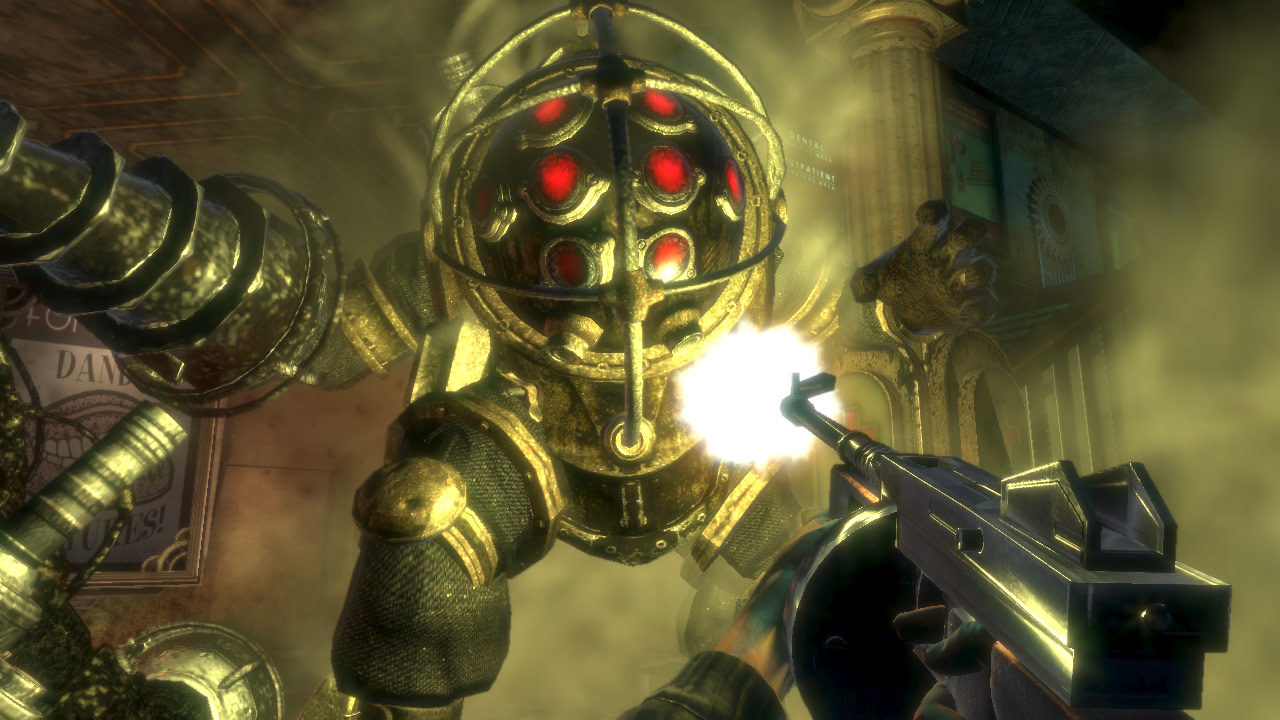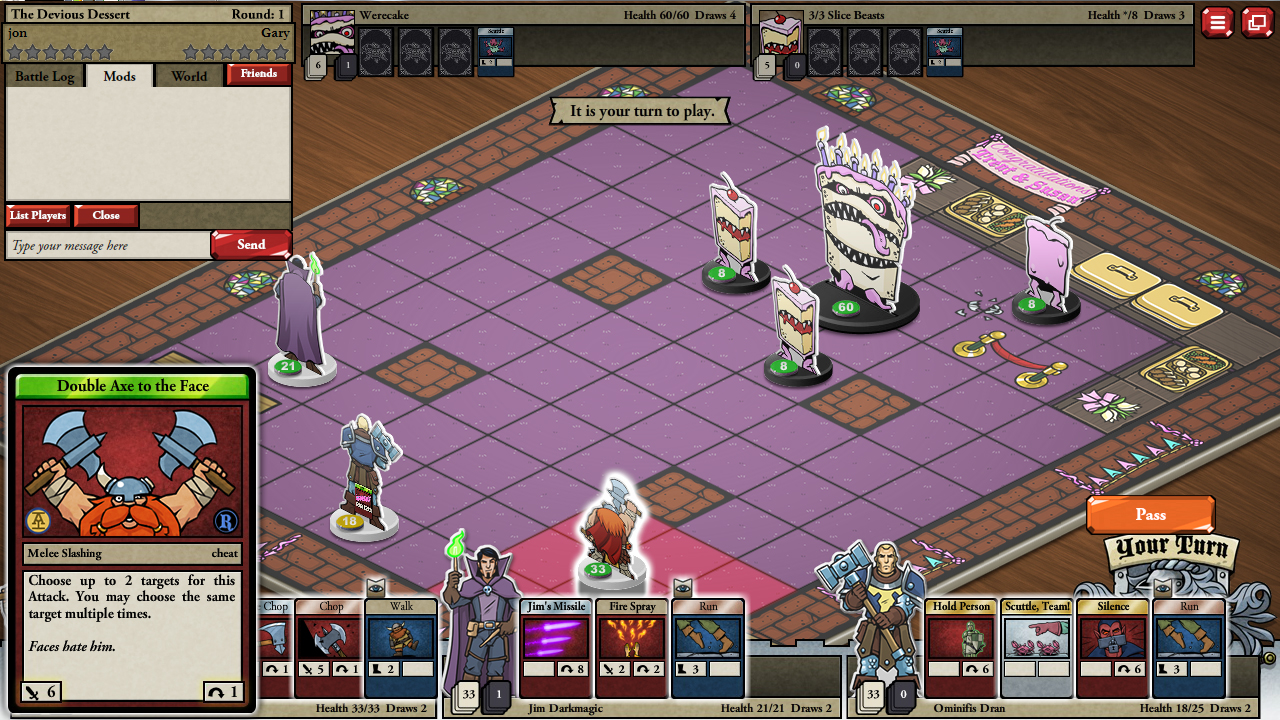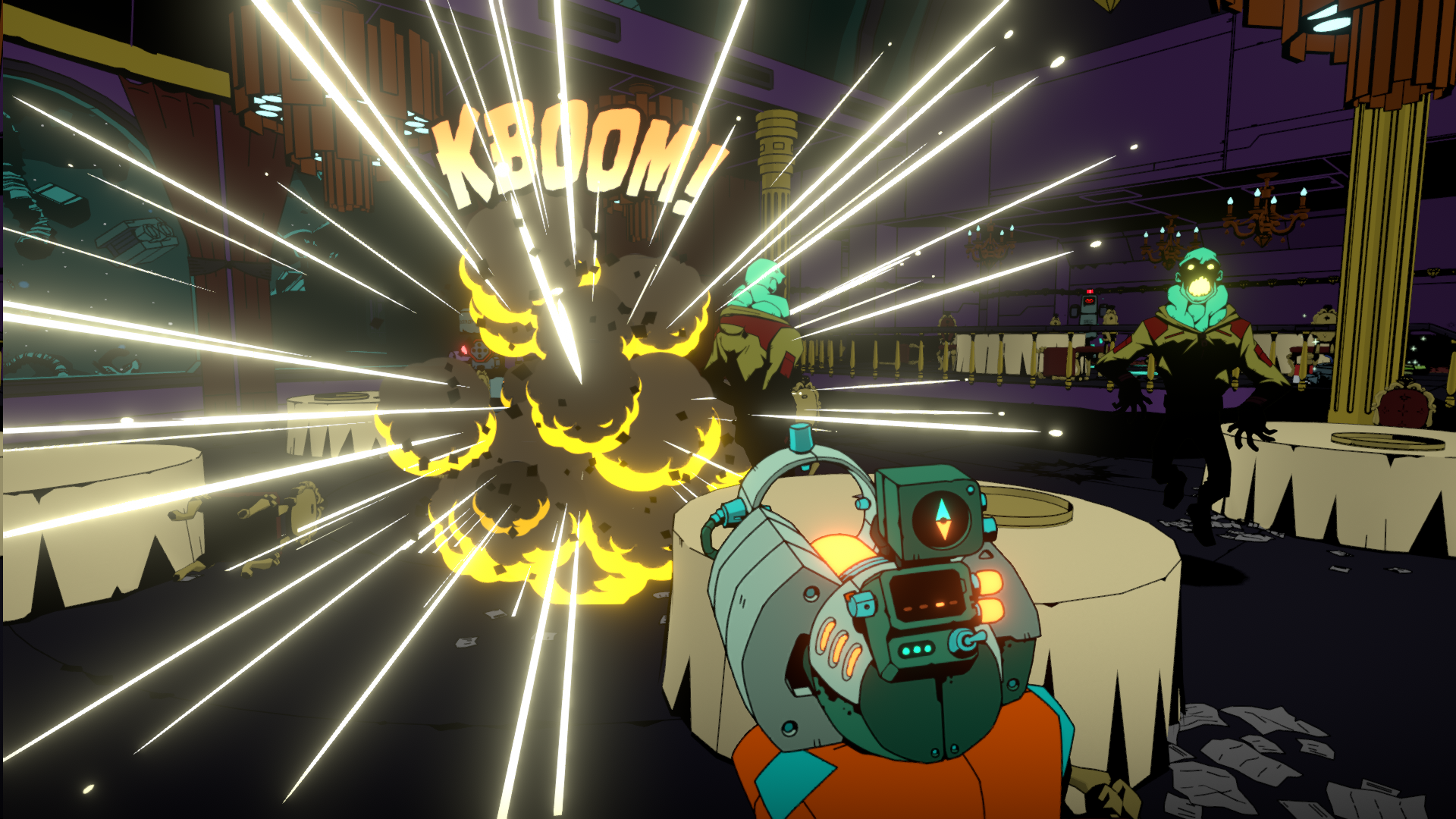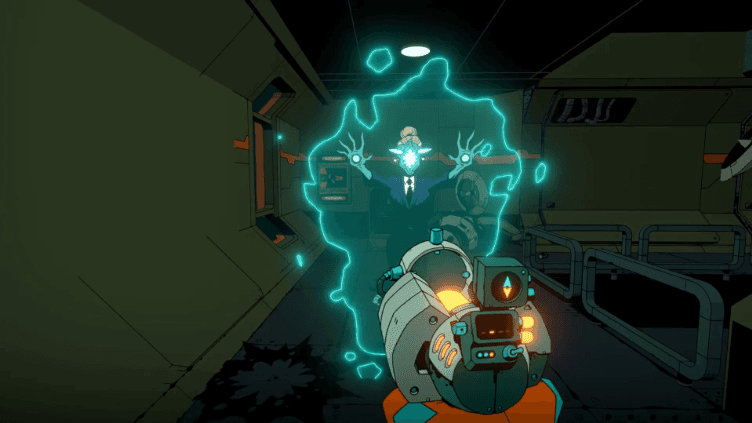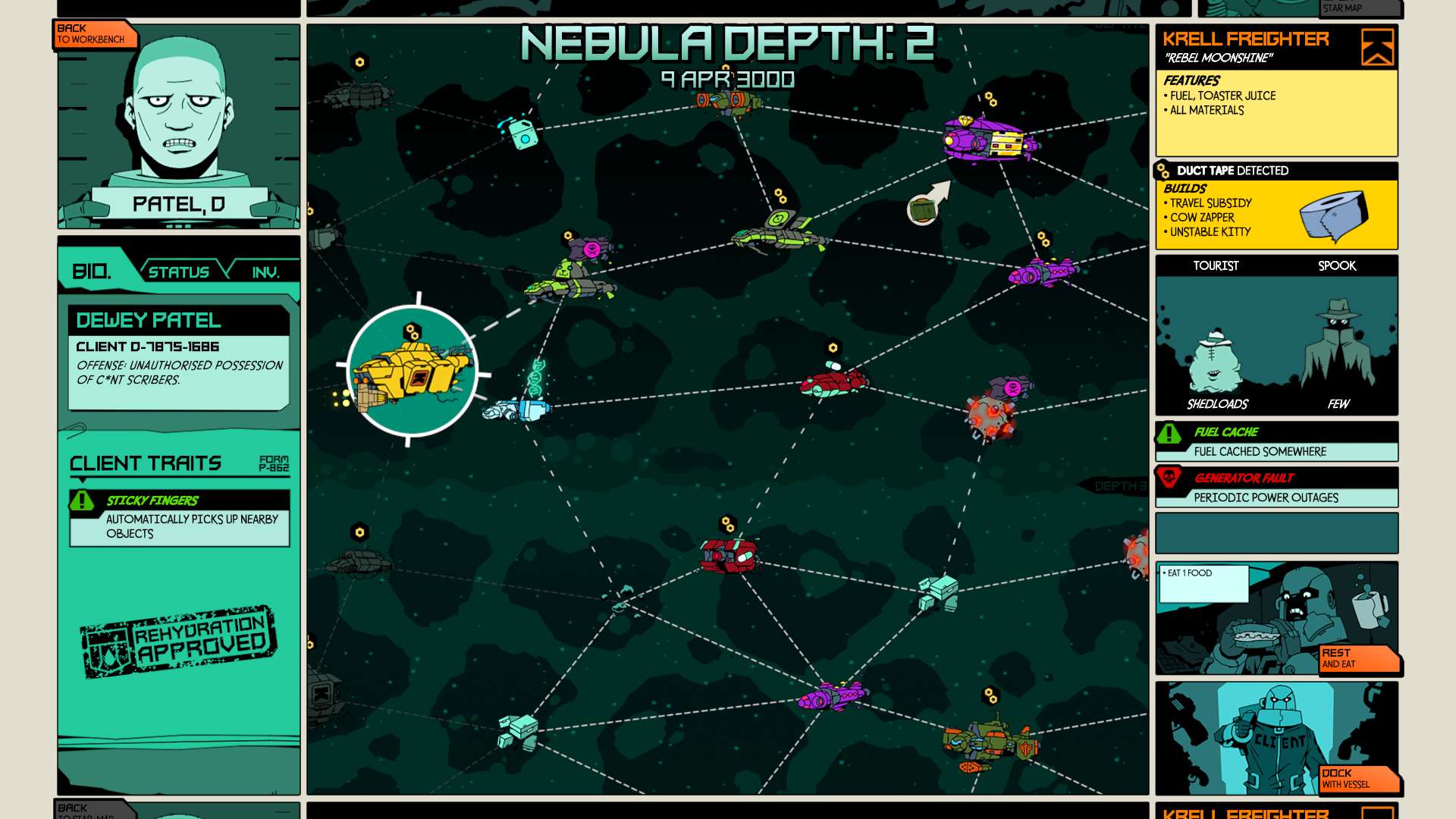After 20 years of making games, Jonathan Chey just refuses to settle.
An alumnus of Looking Glass Studios where he worked on Thief: the Dark Project, he went on to co-found Irrational Games with Ken Levine and Robert Fermier. At Irrational, Jon produced, designed and programmed games such as System Shock 2, Freedom Force and BioShock.
In 2005, Irrational Games was acquired by Take-Two Interactive. Jon stuck around for some years and in 2009 decided to leave AAA game development. In 2011, he founded Blue Manchu, the studio responsible for vastly different Card Hunter (2013) and Void Bastards that came out on May 29, 2019.
Game World Observer talked to Jon Chey about his latest game and the rest of his indie adventure.
Jonathan Chey, Blue Manchu founder and CEO
Going indie
GWO: Jon, you said once that you left Irrational Games because you wanted to be less involved in studio politics and more involved in actually making games. Eight years into your free flight as an indie, has independent game making been everything you hoped it would be?
Jon: I don’t think anything’s ever “everything you hope it will be”, is it? Anyway, in my case indie development is a huge improvement over AAA work for me. I can’t imagine ever going back.
GWO: Did your name and past experience open a lot of doors when you decided to go indie? How dramatic were the stakes for you?
Jon: Yes, I came into indie development with a huge array of advantages over someone who might be starting out from scratch. It was much less daunting than it was when we started Irrational Games as a bunch of nobodies.
I probably didn’t take enough time to think through the stakes. If things didn’t work out I guess I would have been back knocking on doors to try to get a regular job, which would have been … disappointing.
GWO: Does your involvement in BioShock and System Shock 2 haunt you? Do you feel any subjective pressure to try and make games that would be as impactful?
Jon: I honestly doubt that I’ll ever work on games with that sort of impact again. Shooting to repeat those achievements would be a recipe for disappointment. I’m happy to do my own thing and take whatever comes.
Bioshock
GWO: When founding Blue Manchu, how did you go about putting together a team?
Jon: Once again, I was able to leverage my experience and history. The first members of the team were ex-Irrational devs and then we added more people through contacts.
GWO: In its early days, Blue Manchu was a distributed studio with lots of people working remotely and part-time. Could you please tell us how you were able to function as a virtual studio?
Jon: When we started we had no office at all – I was working from home as was everyone on the project. Even back in the mists of time eight years ago, there were plenty of tools for remote collaboration – Skype, email, SVN and so on. The biggest obstacle was probably Skype’s horrible text logging. We did a lot of text chat and Skype was really bad as a place for archiving and searching those conversations.
You learn a lot about time zones when you work remotely using an international team. It’s critical to find times where you can talk and not just fall into the habit of communicating via email. There’s really no substitute for voice chat to maintain a sense of connection.
GWO: Now, as far as I understand, you have a permanent team in Canberra. Why did you transition to a more conventional centralized structure?
Jon: I guess there was a natural gravitation back to Canberra as that’s where I ran the Irrational Australian studio for many years. It’s not really that centralised though – we ran Void Bastards between Canberra, Brighton and Toronto.
Card Hunter
GWO: Void Bastards is the second game that Blue Manchu has made. And it’s very different from the first one, Card Hunter, which is an online tabletop RPG and CCG hybrid. Are you still figuring out your niche?
Jon: I don’t think we have a niche, other than not being mainstream. I’m hoping our next game will be something different again. Like a kart racing dungeon crawler or something like that.
GWO: Did Card Hunter make enough to sustain the studio through the production of Void Bastards?
Jon: Yeah, Card Hunter was profitable – even if not enough to retire on. We’ve had well over 1.5M players. Unfortunately our monetisation strategy was pretty terrible so we didn’t make the revenue that you might expect from those sort of numbers.
GWO: Before we discuss Void Bastards, any words of advice for your fellow indie developers who might be reading this?
Jon: It ain’t easy, but then you’re an indie dev so you already know that.
Void Bastards
Void Bastards
GWO: How did you come up with the idea for Void Bastards?
Jon: The game was originally called Ghost Armada and the guiding principle was to find a way of presenting the kind of tactical first-person shooter situations developed in System Shock 2 in a replayable, procedural format. From there a lot of new ideas developed including the roguelike structure and the bleak sardonic universe.
GWO: I think you implied in the past that you were tired of working on FPS games. Yet, Void Bastards is above all else a first person shooter. Can you tell us where your relationship with FPSes is right now?
Jon: I needed a break from shooters after leaving Irrational/2K (I worked on System Shock 2, Tribes: Vengeance, BioShock and others). Card Hunter was a great break, giving me time to get interested in the genre again. Now I’m probably ready for something different again!
GWO: For VB, you used Unity. Was there any experimentation with other engines?
Jon: Nope, we picked Unity pretty early on to prototype with. As we prototyped, we realised that we wanted to ship the final game in the same engine and not start from scratch with something else. That’s why our development directory for the game still has “prototype” at the root.
Void Bastards
GWO: Could you tell us how you decided what’s the right amount of randomization for VB? What to procedurally generate and what to script?
Jon: So, the game is very procedural with the exception of the level layouts. Each ship is composed of a number of modules that are joined together and the layout of these modules is not randomised (we built a large number of ships and save them out as completed levels). This saved us a good deal of work (stitching together procedurally generated 3D levels is not trivial) and, we think, it also adds to the gameplay as ships have designed layouts that make sense and those layouts can be learned over the course of the game.
GWO: VB is structured around a core loop that feels almost mobile. You enter a ship, you scavenge, then you return to the strategizing meta game. Was the idea to encourage short but regular gaming sessions?
Jon: Yeah, we experimented with lots of different level sizes. Most of our early levels were larger than what we shipped with but we found that they just took too long to complete. One of the things that makes VB stand out from other shooters is the back and forth between the tactical combat and the strategic gameplay. If you spend too long on ships the game starts to feel a lot like a regular level based shooter, which is not what we wanted.
GWO: Void Bastards looks awesome, but not in a triple-A kind of way. Would the game look different if you commanded triple-A budgets?
Jon: We always make a big effort to make our games stand out visually. We want players to be able to look at a screenshot or video of the game and identify it from other titles. That’s really hard to do, of course, and particularly hard to do when you have a small indie budget. I think we did a pretty good job though.
If the game had a AAA budget, we’d probably be more OK with competing on general quality and polish rather than being distinctive through a strong visual style. What would Void Bastards look like in that case? I’ve no idea – though I think it probably wouldn’t have even been made in the first place.
GWO: Almost everybody on the team behind VB except one person is credited for design. At Blue Manchu, is everybody responsible for everything instead of having their respective areas of expertise?
Jon: No, everyone is encouraged to contribute or speak up about anything but we do try to assign areas of responsibility. I’m a big believer in soliciting input from everyone but having one person ultimately responsible for making decisions. That way we know things will get done and not get stuck in some sort of limbo where we try to get consensus from everyone.
Void Bastards
GWO: When making a deranged computer one of the main characters of the game, you obviously stood on the shoulders of giants, including HAL 9000, GLaDOS and Shodan. Where would you say the uniqueness of B.A.C.S. lies in the gallery of these wonderfully inhumane AIs?
Jon: Oh, look, I love B.A.C.S., but I couldn’t really say he’s as well rounded a character as GLaDOS or Shodan. I like to think that his petty obsessions with paperwork are a bit of a change from the usual world domination motives that power a lot of other rogue AIs.
GWO: Somebody commented that they saw Void Bastards on itch.io. Not sure if it’s accurate. Anyway, I don’t think it’s there now. Did you experiment with distribution platforms for VB?
Jon: Nope, we always intended to distribute on Steam first and then add other PC distribution channels.
GWO: For PC distribution, you ultimately decided on Steam and Humble Bundle. How do these two compare for you in terms of revenue?
Jon: The Humble store has been well worth it, though it’s obviously not as big a marketplace as Steam. We’re also available on GOG and that’s also been good for us.
GWO: Will there be a PlayStation release for VB some day? What about Switch?
Jon: We love both those platforms and would love to see Void Bastards on them. Unfortunately, I can’t announce anything specific yet though.
GWO: What’s next for Blue Manchu?
Jon: A long holiday followed by extensive rumination on how things went on Void Bastards. Then freeform discussion about our next project followed by years of grind and stress.
Kidding – really looking forward to doing something else that hopefully brings some joy to the gaming community.


